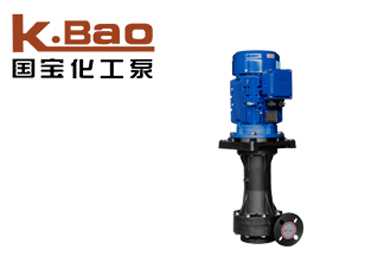
Vertical chemical pump selection
● corrosion resistance
Corrosion has always been one of the most headaches of chemical equipment. If it is slightly careless, it will damage the equipment and cause accidents and even disasters. According to relevant statistics, about 60% of the destruction of chemical equipment is caused by corrosion. Therefore, in the selection of vertical chemical pumps, we must first pay attention to the scientific nature of material selection. There is usually a misunderstanding that stainless steel is a “universal material” and it is dangerous to hold stainless steel regardless of the medium and environmental conditions. Here are some key points for material selection for some common chemical media:
1. Alkali (sodium hydroxide) Steel is widely used in sodium hydroxide solution below 30 °C and 30% concentration. Many factories still use ordinary steel at 100 ° C and below 75%. Although the corrosion is increased, the economy is good. . The corrosion resistance of ordinary stainless steel to lye has no obvious advantages compared with cast iron. Stainless steel is not recommended as long as a small amount of iron is allowed in the medium. For high-temperature alkaline liquids, titanium and titanium alloys or high-alloy stainless steels are often used.
2. Ammonia (Ammonia Hydroxide) Most metals and non-metals are slightly corrosive in liquid ammonia and ammonia (ammonium hydroxide). Only copper and copper alloys should not be used.
3. Brine (seawater) Ordinary steel has a low corrosion rate in sodium chloride solution and seawater and salt water. Generally, it must be protected by paint. All kinds of stainless steel also have a low uniform corrosion rate, but may cause locality due to chloride ions. Corrosion, usually 316 stainless steel is better.
4. Alcohols, ketones, esters, ethers, common alcohols are methanol, ethanol, ethylene glycol, propanol, etc., ketone media are acetone, methyl ethyl ketone, etc., ester media have various methyl esters, Ethyl ester, etc., ether medium is methyl ether, ether, dibutyl ether, etc., they are basically non-corrosive, common materials can be applied, and specific selection should also make reasonable choice according to the properties of the medium and related requirements. Another value of the vertical chemical pump should pay attention to the solubility of ketones, esters and ethers in various rubbers, and avoid mistakes when selecting sealing materials.
5. Screw pump. Sulfuric acid As one of the strong corrosive media, sulfuric acid is an important industrial raw material with a wide range of uses. Different concentrations and temperatures of sulfuric acid have a great difference in corrosion of materials. For concentrated sulfuric acid with a concentration above 80% and temperature less than 80 °C, carbon steel and cast iron have good corrosion resistance, but it is not suitable for high-speed flowing sulfuric acid. Not suitable for pump valve materials; ordinary stainless steel such as 304 (0Cr18Ni9), 316 (0Cr18Ni12Mo2Ti) also has limited use of sulfuric acid media. Therefore, the pump valve for conveying sulfuric acid is usually made of high-silicon cast iron (difficult to cast and process) and {HotTag} high-alloy stainless steel (20 alloy). Fluoroplastics have good sulfuric acid resistance, and the use of a fluorine-lined pump (F46) is a more economical option.
6. Hydrochloric acid Most metal materials are not resistant to hydrochloric acid corrosion (including various stainless steel materials), and molybdenum-containing high silicon iron can only be used for hydrochloric acid at 50 ° C and 30%. Contrary to metal materials, most non-metallic materials have good corrosion resistance to hydrochloric acid, so rubber pumps and plastic pumps (such as polypropylene, fluoroplastics, etc.) are the best choice for transporting hydrochloric acid.
7. Nitric acid is generally destroyed by rapid corrosion in nitric acid. Stainless steel is the most widely used nitric acid resistant material. It has good corrosion resistance to all concentrations of nitric acid at normal temperature. It is worth mentioning that it contains molybdenum-containing stainless steel (such as 316, 316L) The corrosion resistance to nitric acid is not only not superior to ordinary stainless steel (such as 304, 321), and sometimes even worse. For high temperature nitric acid, titanium and titanium alloy materials are usually used.
8. Acetic acid It is one of the most corrosive substances in organic acids. Ordinary steel is severely corroded in acetic acid of all concentrations and temperatures. Stainless steel is an excellent acetic acid resistant material. Molybdenum-containing 316 stainless steel can also be used for high temperature and Dilute acetic acid vapor. High-alloy stainless steel or fluoroplastic pumps are available for demanding requirements such as high temperature, high concentration acetic acid or other corrosive media.













